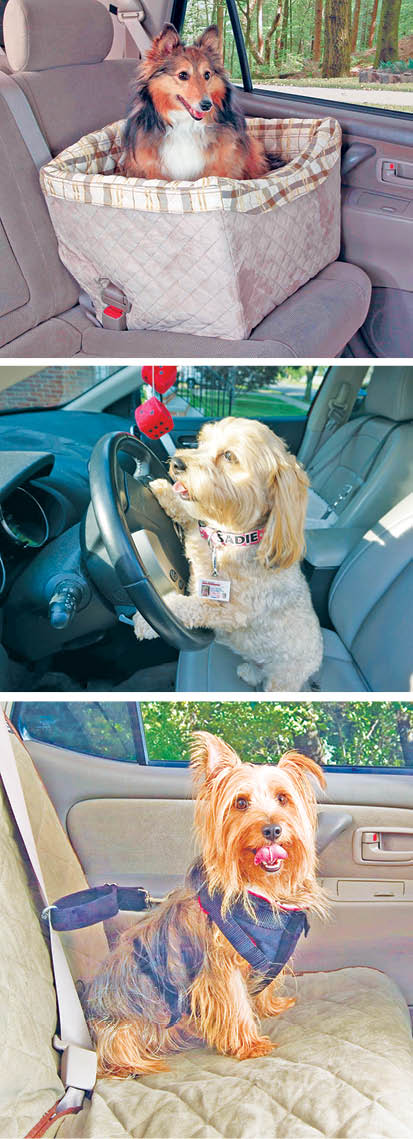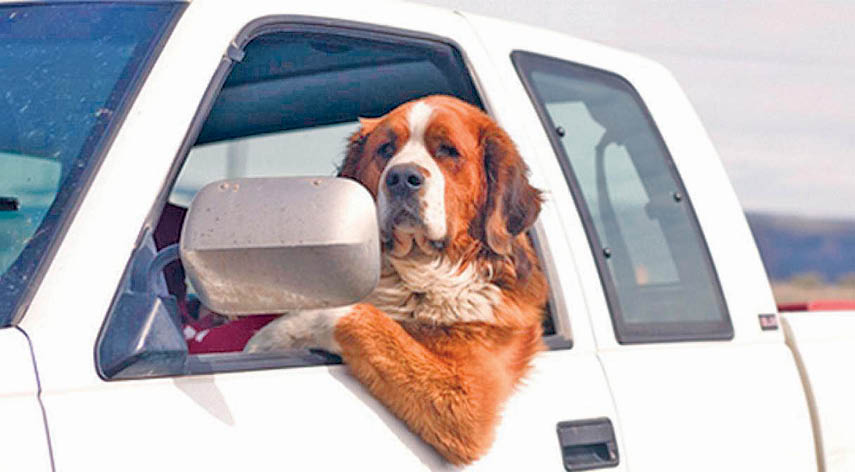 Dogs can make great travelling companions, but for a lot of dogs and owners long car journeys can be a stressful experience. Planning in advance helps make the journey easier for the dog and owner. Use our tips below to ensure both you and your pet have a safe and comfortable journey:
Dogs can make great travelling companions, but for a lot of dogs and owners long car journeys can be a stressful experience. Planning in advance helps make the journey easier for the dog and owner. Use our tips below to ensure both you and your pet have a safe and comfortable journey:
Prepare in advance for a long trip: Ensure that your dog is in good health, vaccinated and recently de-wormed. If your dog dislikes car trips, get him used to them well in advance. Often dogs dislike car trips because the only place they go to is the vet when they are ill. Take your dog for a drive to the park or other places he will enjoy or take him on short runs to do errands. He’ll begin to connect car rides with fun and soon begin to enjoy them.
Keep your dog secure: You may want to consider crating your dog on a long journey – it is safer for him. Put his blanket and a couple of toys inside to make him comfortable. If you are going to crate your dog, remember to get him used to the crate well before the car trip. If your dog must ride loose, consider confining him with a restraint or harness. Not only does this make sure that he cannot jump about and distract the driver, but it also prevents him from being thrown forward in case the car stops suddenly. It can also be useful to teach your dog to stay in one place and to obey simple commands such as, sit, down, stay. Do not allow him on the front seat or to stick his head out the window when the vehicle is moving.
Carsick canines: Like kids, dogs are susceptible to carsickness. To help your dog have a comfortable trip, avoid feeding him six to eight hours before the journey. Pets are less likely to get carsick when they can see the passing scenery, so try to give your dog a window seat; opening the window and letting in fresh air will also help. However, don’t let your dog hang his head out of the window – small particles of dirt can fly into his eyes and hurt him.
Protect the car: You can keep your car seats safe from muddy paw prints and bored pooches with strong seat covers or old rugs.
Give your dog a break: Plan on stopping every few hours to give your dog a chance to get out to stretch his legs and take a toilet break. Keep your dog on a leash to prevent him from straying onto a busy highway.
Water your pet: Always carry fresh water and offer it frequently in small sips to your pet so he won’t become dehydrated. On hot days, it is recommended that you take rest stops every two hours. Feed your dog his regular meal at his regular time, but offer a little less. He’s less active in the car, and is less likely to become nauseated. If you have a dog that is prone to getting car sick, avoid feeding him till you reach your destination.
NEVER Leave the dog alone in the car: When stopping, make sure you park in the shade; even on cool days the inside of a parked car can get uncomfortably hot. NEVER leave your dog in a parked car for more than a couple of minutes. The car can get overheated alarmingly quickly and cause your dog to get a heat stroke or even die in a matter of minutes.
Identify your dog: Make sure your dog wears an identification tag with his and your details on it. In case he gets lost, it will help get him back to you. Ideally, your dog should wear two tags – one with your home information, the other with your vacation contact. It is also wise to carry along a picture of your dog in your wallet. In case he runs away or is lost, it can help people find him faster.
Bowser’s backpack: Remember to pack all of your dog’s necessities for the journey. A few things that you may want to carry along are: dog bowls, leash, snacks, a few toys to keep your dog from getting bored and a brush. Also carry along towels, plastic bags, toilet paper and old newspapers for cleaning up after your dog. Carry along a spare leash and collar – you never know when you may need them. Do not forget to pack your dog’s regular food and some water from home. Dogs cannot adjust to drastic changes in diet. Dry food is a great option during a holiday; it saves time and needs no preparation. Do make sure your dog gets adjusted to the food before the trip.
Be prepared: It is a good idea to carry a small first aid kit with you. Tweezers, gauze (for cuts or a makeshift muzzle in case disaster strikes), antiseptic, travel sickness pills, diarrhoea medicine, an electrolytic powder, painkillers and antihistamine are a good start. Your vet can help you with this list.
- Cracking The Canine Contentment Code: What Makes Dogs Happy - 10 August2024
- The Dark Side Of Pampered Pets: Is Your Kindness Harming Your Dog? - 16 March2024
- Kids And Preventing Dog Bites - 18 March2023
